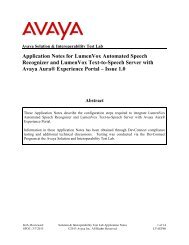1 - LumenVox
1 - LumenVox
1 - LumenVox
You also want an ePaper? Increase the reach of your titles
YUMPU automatically turns print PDFs into web optimized ePapers that Google loves.
Tuning Grammars<br />
There are many places to make effective changes, but generally, we have<br />
found grammars to be the easiest and most effective place to start. In<br />
this segment, we will look at how to detect errors and modify grammars<br />
to optimize performance.<br />
Grammar Terms<br />
In-Grammar (IG) and Out-of-Grammar (OOG) are labels that look at whether the ASR matches<br />
a path in the grammar with what the caller actually said. If it can, then the spoken words are<br />
In-Grammar, if not, the spoken words are considered Out-of-Grammar.<br />
Confidence scores indicate the ASR's certainty about the answer it returns.<br />
Confirmations are dialog techniques to help the speech application avoid making a mistake, in<br />
cases where the results are ambiguous.<br />
Substitutions are a particular kind of error the ASR makes; this occurs when the result from the<br />
ASR does not match the words the caller said.<br />
<strong>LumenVox</strong>’s development and support<br />
staff has been very responsive to our<br />
requirements and issues.<br />
Out-Of-Grammar Indicators<br />
There are a number of ways to determine whether or not the error is due to an Out-of-Grammar<br />
issue. The easiest, most efficient way to discover this is to use the tools provided by the platform<br />
or ASR provider. Pre-configured reports will usually highlight these issues up front.<br />
If Out-of-Grammar is a big problem, you will likely receive many customer complaints and low<br />
completion and usage rates. Call lots will also have many "No Matches" or empty results. Finally,<br />
when you do obtain results, the confidence score will be significantly lower than the rest of the<br />
application.<br />
As the call logs are transcribed, look for low accuracies. ASRs will usually get anything that is<br />
In-Grammar, so if there is still low accuracy, look for a bunch of Out-of-Grammar speech.<br />
The other good indicator is a high Out-of-Grammar rate. Generally, this is a direct indication that<br />
callers are not saying things your grammar understands.<br />
There are a few reasons for Out-of-Grammar problems, most of which are easy to resolve.<br />
One common reason is that the grammar designer simply forgot to add items, but callers are asking<br />
for them. Leaving "next" out of a navigation grammar, or forgetting to add a product name is not<br />
uncommon.<br />
Another common error is forgetting common synonyms, for example, 'copier', but not 'Xerox', or<br />
different dialectal versions such as 'soda' in the west, and 'pop' in the South. Usually, you can just<br />
add the missing items.<br />
In-Grammar Indicators<br />
Typical In-Grammar issues will often be oriented towards improving the confidence scores of<br />
recognition, but you will also confront misrecognitions.<br />
Doug Behl<br />
President of Malibu Software<br />
What kinds of issues arise frequently?<br />
Regularly confused phrases are fairly common, and often result because two or more phrases sound<br />
quite similar. Another common issue is the result of bad pronunciations in the grammar. ASRs<br />
provide a methodology for arriving at pronunciations for words that aren't in the dictionary, but the<br />
automatic pronunciations are not always the best.<br />
So, how can we handle this?<br />
For regularly confused phrases, differentiate them by choosing alternate ways to describe the<br />
words. For bad pronunciations, you must add the pronunciations to the dictionary or grammar.<br />
There are tools for helping with this task, although they are nearly always ASR-specific.<br />
54 55





